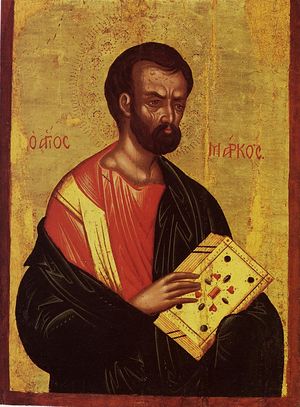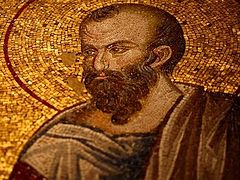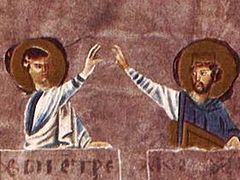Note: While I disagree with Fr. Gregory Hallam on the issues I will address in this article, I appreciate the fact that he produces the podcasts that he does, which are generally very informative.
Is it correct that St. Mark "blundered" in the writing of his Gospel? There is no reason why we should conclude that he did, and you will never find any Father of the Church making any such suggestion. However, this is what Fr. Gregory Hallam stated recently in his E-Quip lecture series, in a lecture about St. Mark's Gospel [beginning at about the 16 minute mark of the recording]:
“…Indeed we must admit, [that St. Mark] sometime got the sequence of events and geographical details in the Gospel incorrect…. In Mark 5:1 Jesus exorcises the Gerasene demoniac -- however, Gerasa is 30 miles south east… south southeast of the lake in question, that is of course what is now known as Galilee. That’s a pretty big jump for those pigs. OK? There is also no 30 mile long embankment running down from Gerasa to the lake to accommodate this onward rush. St. Matthew recognizes St. Mark’s blunder in handling this material, and tries to correct “Gerasa” to “Gadara,” from which we get, of course, the Gadarene swine, but Gadara is still 6 miles from the lake, so it’s hardly a very satisfactory solution. We could say that these are minor matters, and indeed they are. But we could list many others in Mark’s Gospel where he gets geographical or indeed cultural details wrong, concerning Judaism of the time, and the rights of women or otherwise to divorce, he gets wrong. So… you know… this reminds us that these are the writings of ordinary men who were attempting faithfully to present what Jesus said and did, but they’re not verbally inerrant – and I am sorry if that offends some people who are listening to this on Ancient Faith Ministries, but research it yourself. Find out about these geographical lapses and these cultural lapses in Mark’s Gospel, and let that minister to you as you think how we can still call this the word of God and accept human fallibility its compilation. Because that is a fact, you can’t just argue around it, and try and translate “Gerasa” or “Gadara” in different ways. Geography is Geography.”
First off, there is a textual issue with these passages that Fr. Gregory does not address here. Fr. Gregory is assuming the accuracy of the readings found in the Nestle-Aland/United Bible Societies critical editions of the Greek New Testament, which are based on assumptions that are Protestant in origin (namely, that there was an earlier pure version of the Greek New Testament that was later corrupted, and has to be rediscovered and reconstructed, as opposed to accepting the text as the Church has actually preserved it). According to those texts, this is how the Synoptic Gospels describe this place in question:
Mark 5:1: "the country of the Gerasenes..."
Matthew 8:28: "the country of the Gadarenes..."
Luke 8:26: "the country of the Gerasenes..."
It should be noted that the readings in Mark and Matthew are rated "C" in the United Bible Societies text, and the reading is Luke is rated a "D." In that text an "A" reading is one that the editors are very sure of, "B" is less sure, "C" is more questionable, and "D" is the lowest rating that they give to a reading that they adopt in their text.
In the vast majority of Greek manuscripts -- and in the texts which the Church has universally received -- the names of this place that are found in the Synoptic Gospels are as follows:
Mark 5:1: "the country of the Gadarenes..."
Matthew 8:28: "the country of the Gergesenes..."
Luke 8:26: "the country of the Gadarenes..."
The evidence for these readings are very strong, though there is some support for "Gergesenes" in Mark 5:1. But in any case, any way you slice it, we have at least two names in the Gospels for this place. It should be noted that in none of these readings do we find it speaking of a city directly associated with these names, but rather it speaks of "the country of...", which is a very general description of the place. The Tradition of the Church tells us exactly where this miracle took place -- the present day Kursi, or Kersa, which was known in ancient times as "Gergesa," which is on the eastern shore of the sea of Galilee. This place fits the narrative perfectly. And yet this place was probably not well known, and so it is described as being in the region of the Gadaranes (i.e. the district of Gadara -- which was the chief city of the area at that time, and would have been generally better known).
The textual variations are most likely due to the fact that you had two place names found in the Synoptic Gospels, and some scribes attempted to harmonize them. But does this mean that at least one of these names is wrong? No. This area was a pagan area, and so there were no doubt Greek names for the locations in this area, but Aramaic speaking Jews would have used some variation of those names.
I live in Spring, Texas (which is also where my parish is), but Spring is actually not an incorporated city, and so is really governed by Harris County, though Houston is the city that dominates Harris County, and the City of Houston has some extra-territorial jurisdiction over this area (as I discovered much to my irritation during the permitting process for the construction of our current Church building). When people ask me where I live, depending on how much time I have to explain, and whether or not I think they have any idea of the local geography, I sometimes will tell them that I live in Houston, simply because most people don't know where Spring, Texas is, and it is in fact part of the Metropolitan Houston area. So I could say that I live in Spring, Texas, or Houston, or Harris County, and yet all three statements would be true -- and this is true without mixing in the question of variations on place names due to the transmission of those names through different languages.
The following video deals with this question at about the 50 minute mark:
If you watch this video from the beginning, you will see that it addresses some other claims of geographical errors in the Gospel of Mark, and does so very handily.
Fr. Gregory alludes to another claim, made by Bart Ehrman, that the Gospel of Mark is in error, when it says in Mark 7:3 that the Jews would not eat with unwashed hands. The video above addresses that claim just after the 20 minute mark, and it points out that this claim is baseless, and that there is ample extra-biblical evidence of this being the common practice of the Jews of that period.
Furthermore, Fr. Gregory references the claim that St. Mark erred in Mark 10:12, by speaking of women divorcing their husbands. It is argued that Jewish law made no provision for a woman to divorce her husband, and so therefore, St. Mark clearly didn't know what he was talking about here. However, this ignores the rather notorious example of Herodias, who divorced her first husband in order to marry Herod, her brother-in-law. That this happened is recorded not only by the Gospels, but also by the Jewish historian Josephus. The above video addresses this question about the 24 minute mark.
So it is not simply a matter of fact that St. Mark erred in his Gospel. Geography is geography, but when you are talking about the names of places in a region that has experienced more than a few cultural upheavals in the past 2000 years, it is not simply a matter of getting out a map and proving that St. Mark made an error. In fact, on closer inspection, the geography of St. Mark's Gospel is very accurate, and provides a great deal of evidence of its traditional origins as an account written by St. Mark but based on the recollections of St. Peter.
For example, here is a lecture by Dr. Richard Bauckham: "Mark's Geography and the origin of Mark's Gospel":
Here addresses the question of the story of the Demoniac in Mark 5 beginning at just before the 30 minute mark. He assumes that the reading of "Gerasenes" is correct, but provides a very plausible explanation for how that name would not refer to the city of Gerasa, as Fr. Gregory assumes, but to the region of the eastern shore of the sea of Galilee. The entire lecture is well worth listening to.
Regardless of how one decides the textual issues I mentioned, there is no reason why an Orthodox Christian needs to conclude that the Gospels are in error. The Tradition of the Church clearly teaches us that the Scriptures are without error.* When we see something in Scripture that seems problematic, we may or may not always know how to definitively resolve the question of how to explain the problem, but the faith of the Church is that the Scripture is without error, and it is contrary to that Faith to make assertions to the contrary.
*For those who assert that the Orthodox Church does not affirm the inerrancy of Scripture, I refer you to the quotations from the Fathers in the article on inerrancy below, and challenge anyone to produce a single instance of a Church Father that asserted that there were any real errors in Scripture.
For More Information:
The Inerrancy of Scripture, by Fr. John Whiteford
I would also recommend Dr. Richard Bauckham's lecture "The Authenticity of the Apostolic Eyewitness in the New Testament":
Update: Just today there is news of new archeological evidence in support of Kursi as the location of the miracle in Mark 5: Archaeologists Find Hebrew Letters Engraved on Tablet at Jesus Miracle Site.





